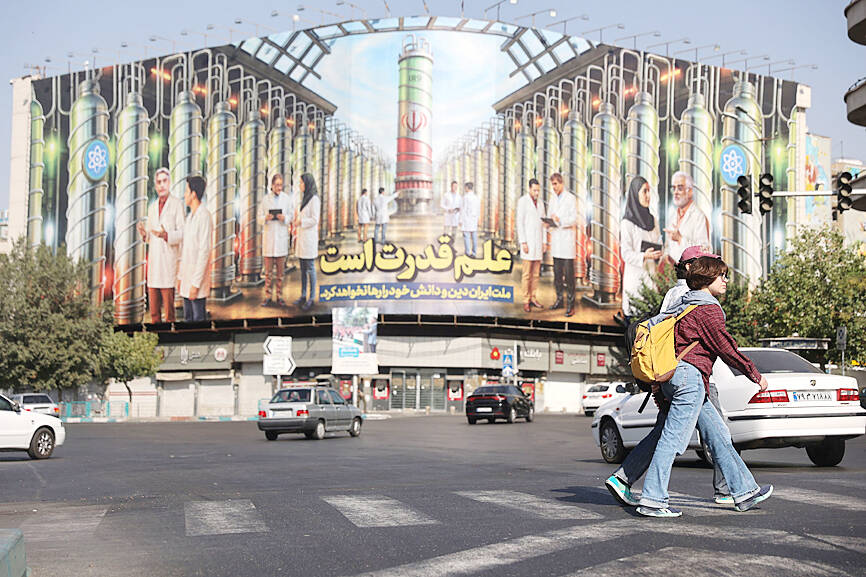France, Germany and the UK on Thursday moved to reimpose UN sanctions on Iran over its nuclear program, further isolating Tehran after its atomic sites were repeatedly bombed during a 12-day war with Israel.
The process, termed a “snapback” by the diplomats who negotiated it into Iran’s 2015 nuclear deal with world powers, was designed to be veto-proof at the UN and could take effect in a month.
It would again freeze Iranian assets abroad, halt arms deals with Tehran and penalize any development of Iran’s ballistic missile program, among other measures, further squeezing the country’s reeling economy.

Photo: Reuters
The move starts a 30-day clock for sanctions to return, a period that likely would see intensified diplomacy from Iran.
The three European nations on Aug. 8 said that Iran could trigger the snapback when it halted inspections by the International Atomic Energy Agency after Israeli strikes at the start of the two countries’ 12-day war in June.
The European nations triggered the sanctions process through a letter to the UN Security Council, and suggested they viewed it as a way to spur negotiations with Tehran.
“This measure does not signal the end of diplomacy: we are determined to make the most of the 30-day period that is now opening to engage in dialogue with Iran,” French Minister for Europe and Foreign Affairs Jean-Noel Barrot wrote on X.
“Iranian leaders perceive a sanctions ‘snapback’ as a Western effort to weaken Iran’s economy indefinitely and perhaps stimulate sufficient popular unrest to unseat Iran’s regime,” the New York-based Soufan Center said on Thursday.
After Europe’s warning, Iran initially downplayed the threat of renewed sanctions and engaged in little visible diplomacy for weeks, but it did take part in a brief diplomatic push in recent days, highlighting the chaos gripping its theocracy.
In Tehran on Thursday, the rial traded at more than 1 million to US$1. At the time of the 2015 accord, it traded at 32,000 rial to US$1, showing the currency’s precipitous collapse over the past decade.
The snapback mechanism would expire on Oct. 18. After that, any sanctions effort would face a veto from UN Security Council members China and Russia — nations that have provided some support to Iran in the past. China has remained a major buyer of Iranian crude oil, something that could be affected if the snapback happens.
Russia on Thursday announced that Moscow and Beijing introduced a draft resolution to the Security Council, offering a six-month extension of the sanctions relief.

CHARGES: The former president, who maintains his innocence, was sentenced to 27 years and three months in prison for a failed coup bid, as well as an assassination plot Far-right former Brazilian president Jair Bolsonaro is running out of options to avoid prison, after judges on Friday rejected his appeal against a 27-year sentence for a botched coup bid. Bolsonaro lost the 2022 elections and was convicted in September for his efforts to prevent Brazlian President Luiz Inacio Lula da Silva from taking power after the polls. Prosecutors said the scheme — which included plans to assassinate Lula and a top Brazilian Supreme Court judge — failed only due to a lack of support from military top brass. A panel of Supreme Court judges weighing Bolsonaro’s appeal all voted to uphold

The latest batch from convicted sex offender Jeffrey Epstein’s e-mails illustrates the extraordinary scope of his contacts with powerful people, ranging from a top Trump adviser to Britain’s ex-prince Andrew. The US House of Representatives is expected to vote this week on trying to force release of evidence gathered on Epstein by law enforcement over the years — including the identities of the men suspected of participating in his alleged sex trafficking ring. However, a slew of e-mails released this week have already opened new windows to the extent of Epstein’s network. These include multiple references to US President Donald

Chinese tech giant Alibaba yesterday denied it helps Beijing target the US, saying that a recent news report was “completely false.” The Financial Times yesterday reported that Alibaba “provides tech support for Chinese military ‘operations’ against [US] targets,” a White House memo provided to the newspaper showed. Alibaba hands customer data, including “IP addresses, WiFi information and payment records,” to Chinese authorities and the Chinese People’s Liberation Army, the report cited the memo as saying. The Financial Times said it could not independently verify the claims, adding that the White House believes the actions threaten US security. An Alibaba Group spokesperson said “the assertions

LEFT AND RIGHT: Battling anti-incumbent, anticommunist sentiment, Jeanette Jara had a precarious lead over far-right Jose Antonio Kast as they look to the Dec. 14 run Leftist candidate Jeannette Jara and far-right leader Jose Antonio Kast are to go head-to-head in Chile’s presidential runoff after topping Sunday’s first round of voting in an election dominated by fears of violent crime. With 99 percent of the results counted, Jara, a 51-year-old communist running on behalf of an eight-party coalition, won 26.85 percent, compared with 23.93 percent for Kast, the Servel electoral service said. The election was dominated by deep concern over a surge in murders, kidnappings and extortion widely blamed on foreign crime gangs. Kast, 59, has vowed to build walls, fences and trenches along Chile’s border with Bolivia to